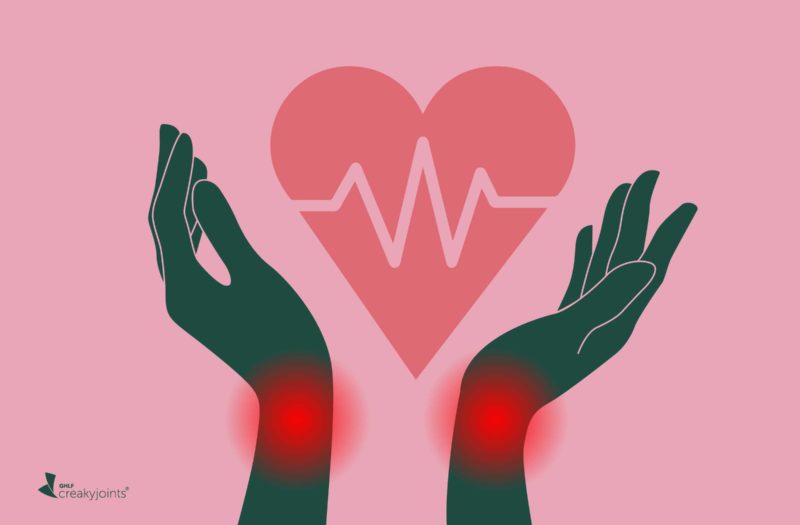Key Takeaways
- People with psoriatic disease have a higher-than-average risk of cardiovascular disease.
- New study finds strong link between protein found on heart muscle and likelihood of having a heart attack or stroke, yet prediction is no better than using the Framingham Risk Score.
- If you have psoriatic disease, consider discussing which tests you should be taking to access your cardiac risk with your doctor.
Several studies have found that people with psoriatic disease (psoriasis and psoriatic arthritis) have a higher-than-average risk of cardiovascular disease. There are many possibly reasons why, including underlying inflammation and common shared risk factors like obesity and high cholesterol. Now new research shows that psoriasis (PsO) and psoriatic arthritis (PsA) patients who have higher levels of two substances that can be measured in the blood might be in greatest danger.
The study, which appears in Arthritis & Rheumatology, found a strong association between cardiac troponin and N-terminal pro-brain natriuretic peptide (NT-proBNP) levels and the likelihood that someone with psoriasis or psoriatic arthritis will suffer a cardiovascular event like a heart attack or stroke.
Troponin is a protein that is generally only found in the heart muscle. If it’s detected in a blood test, it means that your heart has suffered some damage that resulted in sending this protein in the bloodstream. If levels are very high, it means that you’re having a heart attack or have had one recently.
NT-proBNP is a substance that rises when there’s too much pressure inside the heart. Most people have only a small amount in their bloodstream. If levels in the blood are high, it means your heart is having trouble pumping blood — which is characteristic of congestive heart failure.
Previous studies have already connected high blood levels of troponin and NT-proBNP to a high risk of cardiovascular events, but there hasn’t been much research specifically on people with rheumatic disease. The new study used information from a large group of psoriatic disease patients who have been treated at the University of Toronto for many years (some starting in 1978).
The participants agreed to allow researchers access to their data, including blood samples that are stored in a biobank. Researchers were able to use these blood samples to test for troponin and NT-proBNP.
The patients also had carotid artery ultrasounds, which show whether someone has a buildup of plaque in one or both of the carotid arteries in the neck. Plaque buildup in this area puts you at risk for stroke.
Additionally, everyone in the study had their 10-year risk of having a major cardiovascular event calculated using a common risk calculator (the Framingham Risk Score) that factors in your age, biological sex, smoking status, blood pressure and cholesterol levels, and whether you have diabetes. Because study participants had been followed for many years, the researchers were also able to find out who had already had a heart attack, stroke, or other serious event.
The researchers determined that high levels of troponin and NT-proBNP were “associated with a higher risk of developing future [cardiovascular events] independent of traditional [cardiovascular] risk factors” in people with psoriatic disease. The catch is that adding information about patients’ levels of these two substances did not seem to predict cardiovascular outcomes any better than using the Framingham Risk Score by itself.
The bottom line: While blood tests for troponin and NT-proBNP levels are unlikely to become routine, they might prove useful if you start to have symptoms and your doctor is unsure about how to treat you. “These data encourage additional research evaluating the utility of [troponin] and NT-proBNP in [cardiovascular] risk stratification of this patient population,” the authors concluded.
Found This Study Interesting? Get Involved
If you are diagnosed with arthritis or another musculoskeletal condition, we encourage you to participate in future studies by joining CreakyJoints’ patient research registry, ArthritisPower. ArthritisPower is the first-ever patient-led, patient-centered research registry for joint, bone, and inflammatory skin conditions. Learn more and sign up here.
Cleveland Clinic. NT-proB-type Natriuretic Peptide (BNP). https://my.clevelandclinic.org/health/diagnostics/16814-nt-prob-type-natriuretic-peptide-bnp.
Eder L, et al. Association of Cardiac Biomarkers with Cardiovascular Outcomes in Patients with Psoriatic Arthritis and Psoriasis: A Longitudinal Cohort Study. Arthritis & Rheumatology. March 2022. doi: https://doi.org/10.1002/art.42079.
National Library of Medicine. Medline Plus. Troponin Test. https://medlineplus.gov/lab-tests/troponin-test/.
University of California San Francisco. Carotid Ultrasound. https://vascularsurgery.ucsf.edu/conditions–procedures/carotid-ultrasound.aspx#:~:text=A%20carotid%20ultrasound%20can%20show,much%20blood%20flow%20is%20restricted.






